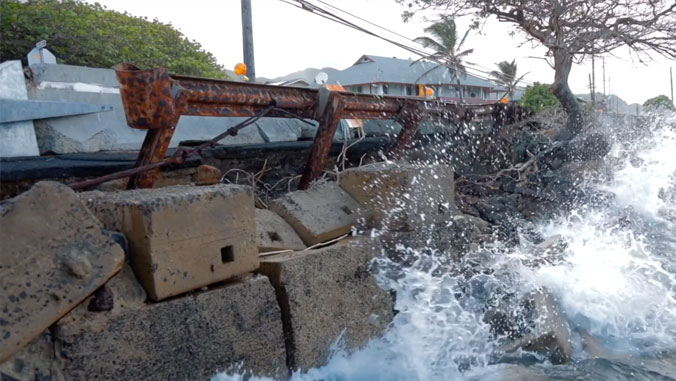
Recent hurricanes, tsunamis and other natural disasters have demonstrated how vulnerable the state is when these events occur. To address these natural disasters and climate change issues, University of Hawaiʻi at Mānoa College of Engineering faculty and graduate students are working with campus departments and government and industry partners to determine how these factors will affect Hawaiʻi over the next several decades.
In a video released earlier this summer, UH researchers, graduate students and experts from government agencies share how they are exploring a wide range of topics including energy distribution, food production and sustainability, water safety and coastal infrastructure resiliency.
“We’ve been working with the College of Tropical Agriculture and Human Resources on a number of initiatives relating to food production, which include advancement of systems for soil condition monitoring, smart irrigation systems and innovative greenhouse design,” said David Ma, associate dean of engineering. “The engineering faculty have also been working with economists in the College of Social Sciences to create a graduate certificate program in renewable energy and island sustainability.”
Accessibility by land, sea and air
Hawaiʻi State Department of Transportation (DOT) experts estimate that, in the next 50 years, Hawaiʻi’s coastal roads will be affected by climate change.
“Being in a closed system like Hawaiʻi, very limited land, very limited resources, we make sure we fulfill our responsibility of a safe, accessible and efficient transportation system by land, sea and air,” said Ed Sniffen, state DOT deputy director of transportation. “Given the situation right now, considering sea level rise, changes in the environment, we’re expecting 20 percent of our coastal roads will be impacted in the next 50 years. That’s a $15 billion problem. We work with UH on a lot of different issues.”
Engineering students are researching ways to prevent major infrastructural surprises. “Being on a project like this is really important because part of being a PhD student is to contribute, to give back,” said Harrison Togia, a civil engineering doctorate student. “We do coastal hazard assessment broadly and that means looking at sea level rise, coastal erosion…hazards that we expect near or around the infrastructure.”
“There’s a lot of expertise in the College of Engineering to address infrastructure engineering,” said Horst Brandes, a professor in the Department of Civil and Environmental Engineering. “We have people working on roads. We have people working on ocean hazards. We have experts working on tsunamis and many other issues that are of concern for the state of Hawaiʻi.”

